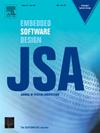面向汽车软件可维护性度量的二维可维护性指标
IF 3.7
2区 计算机科学
Q1 COMPUTER SCIENCE, HARDWARE & ARCHITECTURE
引用次数: 0
摘要
自动驾驶和高级驾驶辅助系统(ADAS)技术的大量采用,增加了基于模型开发的汽车嵌入式软件的复杂性和维护成本。通过基于模型的开发工具(例如MATLAB/Simulink),通过架构转换自动生成代码;但是,不合理的软件架构设计会使最终生成的代码难以维护。目前,微软可维护性指数(MMI)和博世可维护性指数(BMI)都用来衡量代码的可维护性,而软件架构都没有。通过分析汽车软件体系结构、软件质量模型和行业相关标准的特点,建立了四层可维护性指标模型。然后,我们提出了二维可维护性指数(TMI),这意味着代码和体系结构维度同时被考虑。这是可维护性度量的第一个工作,它将代码和架构维度结合起来,同时确保低冗余。TMI利用9个指标来指导架构重构和代码优化,显著提高了软件的可维护性。本文章由计算机程序翻译,如有差异,请以英文原文为准。
TMI: Two-dimensional maintainability index for automotive software maintainability measurement
The mass adoption of autonomous driving and Advanced Driver-Assistance System (ADAS) technologies increases the complexity and maintenance cost of automotive-embedded software during model-based development. Through model-based development tools (e.g., MATLAB/Simulink), the code is automatically generated by architectural transformation; however, unreasonable software architecture design could make the final generated code be difficult to maintain. Currently, both Microsoft Maintainability Index (MMI) and Bosch Maintainability Index (BMI) are used to measure the maintainability of code, but neither software architecture. We establish a four-layer maintainability index model by analyzing the characteristics of automotive software architecture, software quality model, and industry-related standards. We then propose a Two-dimensional Maintainability Index (TMI), meaning the code and architecture dimensions are simultaneously considered. This is the first work of maintainability measurement to combine code and architecture dimensions while ensuring low redundancy. TMI utilizes nine index metrics to guide architecture refactoring and code optimization, significantly improving software maintainability.
求助全文
通过发布文献求助,成功后即可免费获取论文全文。
去求助
来源期刊

Journal of Systems Architecture
工程技术-计算机:硬件
CiteScore
8.70
自引率
15.60%
发文量
226
审稿时长
46 days
期刊介绍:
The Journal of Systems Architecture: Embedded Software Design (JSA) is a journal covering all design and architectural aspects related to embedded systems and software. It ranges from the microarchitecture level via the system software level up to the application-specific architecture level. Aspects such as real-time systems, operating systems, FPGA programming, programming languages, communications (limited to analysis and the software stack), mobile systems, parallel and distributed architectures as well as additional subjects in the computer and system architecture area will fall within the scope of this journal. Technology will not be a main focus, but its use and relevance to particular designs will be. Case studies are welcome but must contribute more than just a design for a particular piece of software.
Design automation of such systems including methodologies, techniques and tools for their design as well as novel designs of software components fall within the scope of this journal. Novel applications that use embedded systems are also central in this journal. While hardware is not a part of this journal hardware/software co-design methods that consider interplay between software and hardware components with and emphasis on software are also relevant here.
 求助内容:
求助内容: 应助结果提醒方式:
应助结果提醒方式:


